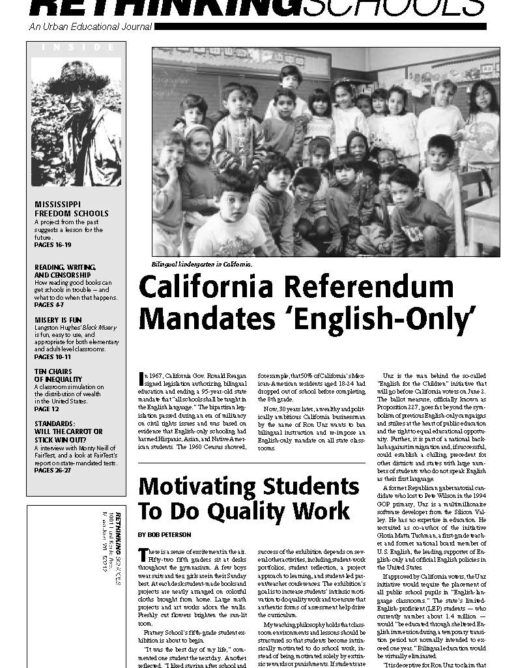States Get Failing Grade in Assessment
The student tests used in most states get failing grades in a new study by FairTest, the National Center for Fair & Open Testing.
The FairTest study concludes that a third of the states need to “completely overhaul” their testing programs, another third need major improvements, and most of the rest have flaws that need to be addressed. Only one state, Vermont, received FairTests’s highest ranking as a “model system.”
“Despite nearly a decade of intensive discussions about the role and nature of assessment, and despite some important improvements, the fundamental approach of state testing programs has not changed,” according to the study. “Though the labels have often been revised to assessment, most state programs still predominately rely on traditional multiple choice tests, and many states use them inappropriately to make high-stakes decisions.”
The 180-page study, “Testing Our Children: A Report Card on State Assessment Systems,” compared state testing practices to standards produced in 1995 by a coalition of education activists and civil rights groups working through the National Forum on Assessment. That report called for assessments that are: Grounded in solid knowledge of how students learn; connected to clear statements of what is important for students to learn; flexible enough to meet the needs of a diverse student body; and able to provide students with the opportunity to actively produce work and demonstrate their learning.
The new FairTest study carefully examines the student-testing programs in every state, and chronicles in detail how well — or how poorly — each program meets these goals. Among the report’s key findings:
- Most states rely too much on multiple-choice testing and only rarely use assessment techniques such as portfolios and performance events.
- Too many states use norm-referenced tests, which compare students to reference groups and not to achievement on state standards. This encourages instructional practices, such as tracking, that historically have denied many students a strong education.
- While many states now have content standards, state tests often aren’t based on those standards.
- Most state testing programs provide information on too narrow a range of student learning.
- Most states focus too much on rote learning, rather than complex and critical thinking and the ability to use knowledge in real-world situations.
- Too many states use a single test as a mandatory hurdle for graduation or advancement, instead of making decisions about students from multiple sources of evidence.
- Since tests influence curriculum and instruction, most state tests are obstacles to high quality classroom practice and fail to support strong school reform.
- Since most assessments don’t give students a chance to demonstrate sustained or engaged thinking, they’re not useful for shaping curriculum and instruction — even though that’s a goal most states claim for their testing programs.
- Most tests provide little or no information on whether students can actually use the things they have supposedly learned.
- Very few states use sampling for accountability purposes, even though it’s accurate, less expensive than testing all students, and facilitates the use of portfolios and performance events.
- States, generally, are quite weak in providing teachers and other educators with professional development on assessment, or any evaluation of their assessment skills.
- Outreach to the public about assessment is often inadequate, especially in languages other than English.
“Driving school reform with traditional tests will not succeed,” FairTest concludes, “if the nation really wants all children, not just the children of the wealthy, to gain an education that challenges their minds and spirits, that assumes not only that they can learn some skills, but can learn to use their learning as active participants in a democratic society.” The FairTest study found that the negative effects of teaching to narrow tests most powerfully affect schools with large proportions of minority-group and low-income children. These children “are particularly at risk of continuing to receive a low-level education that will not prepare them well for their adult lives.” Students face the same risk in large cities that emphasize teaching to traditional tests.
The FairTest study includes a list of recommendations for improving assessment, such as employing more portfolio assessment, relying on sampling to collect accountability data instead of testing every child, and limiting the number of multiple-choice or short-answer questions a test-taker must answer. But the study also makes it clear that it is a lack of political will, not a lack of technical expertise, that is holding back meaningful assessment reform.

